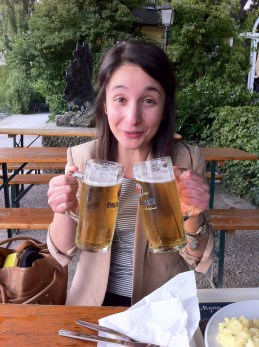While enjoying a quiet beer with an Australian, you’re guaranteed to hear my boyfriend pose the following question:
Do you know what’s astonishing about both Australian and German beer?
After receiving a shrug, he would reply with:
Well of course, German beer contains four ingredients and each beer tastes different from the next. Australian beer can contain up to hundreds of ingredients and it all manages to taste the bloody same. I’m not sure which technique is more of an art form?!

Whether the question is true is debatable (being a non- beer drinker myself I can’t really judge) but one thing is certain – alongside being proud beer drinkers, Germans are proud of their beer. And rightly so. April 23rd 2016 marked 500 years of the Reinheitsgebot – German Purity Law. A law which has established a standard of beer brewing since 1516.
Allow me to briefly enlighten you:
- Duke Herzog Wilhelm IV and his brother Duke Ludwig X proclaim the Purity Law in Ingolstadt, Bavaria on 23rd April 1516.
- The law slowly came into effect throughout more German provinces until accepted by all of Germany in 1906.
- The law requires that beer brewed in Germany can only include four ingredients: water, hop, malt and yeast (introduced shortly after the laws introduction).
- This means no artificial flavors, enzymes or preservatives may be added to the beer – making it a completely natural product.
- Why was it introduced? To avoid exorbitant beer prices in the market and protect beer drinkers from ingredients that may be harmful.
And while I’m on the topic…
- Germany produces 1/3 of the worlds hops.
- 80% of this is grown in Hallertau – A Bavarian city boasting the largest continuous hop-plantation in the world with 178 km².
- Germany counts approximately 1300 breweries, 950 of which are still privately owned. The major Munich breweries have been bought by corporations.
It goes without saying that beer is Germany’s cultural asset – from holding the worlds most popular annual beer event, to simply spending a summer afternoon in the Biergarten and in 9 cases out of 10, cheaper than water. Wherever you are – there will always be beer. And in quantities.

And if there were any excuse for a beer, this 500 year anniversary would top the list.
For the love of beer, Bavaria has extended the celebrations over the next month – beginning with, as you’ve surely guessed – a beer-fountain in Munich’s city centre gushing with free beer for the thirsty. Not to be short on choice – the fountain offered a choice of Helles, Dunkles and Wheat beer.


(FYI The beer-fountain was erected in 1958 for the brewery).
Naturally, no celebration in Germany would be official without the “royal” representative – here the regional Beer Queen (Bierkönigin) to kick off the event. Obviously the most fitting for the occasion.

Bavaria’s Bierkönigin Marlene Speck has a full program over the next few months – mainly consisting of gallivanting from event to event, looking good in her official workwear (ie. dirndl) and tapping a beer barrel or two on the way. Let’s hope she’s got a good hangover remedy.
Ladies, you may have missed your chance for 2016 – but applications aren’t far off for the Beer Queen 2017. While you’re at it, you may as well try your luck with the titles of 2017 Asparagus Queen, Potato Queen, Strawberry Queen, Cheese Queen*…the list goes on.
Amongst the many celebrations – Miss Beer Queen is gearing up for the highlight: a three-day celebration in Munich’s Odeonsplatz. There will be Pork. Whip-cracking. Folk music. And a lot of beer.
And of course, while the drinkers raise their beer krugs, the critics have used the opportunity to make claims for evidence of wide presence of pesticides in German beer – weed killer and plastic particles amongst other things. No proof to date.
So, even though the celebrations are somewhat amusing, and threats of pesticides or not – Germany has a reason to be proud. With so many commercial industries taking advantage of consumers (hello sugar!), lets celebrate these long-held beer quality standards. Here’s hoping that over the next 500 years we’ll see some other positive changes.
So, who’s up for a quiet beer?

Read more: http://reinheitsgebot.de/startseite
*No, I’m not kidding. These titles do exist.


A Prost right back at you, dear Alexandra, for this lovely write up about German beer!
In my humble opinion the German “Reinheitsgebot” indeed provides and protects some quality in beer-making.
My husband, who is US-American, enjoys to taste-test himself through all the beer variety and even found a really good micro-brewery here in Hamburg, that I had not heard of, before. I would say, that corresponds nicely with what you have written, here.
As a North German gal I , of course, won’t say no to a good beer. But I have to admit that I am picky. 😉 So, in Bavaria I would rather opt for (shhh… I lower my voice at this point) wine, as I do not enoy wheat beer and find the Southern barley beers I had the honour to taste too (I lower my voice even further…) “watery” in taste. It seems to me that, here, in the North, we like it a bit stronger and more bitter. But hey, what do I know of German beer when my favourite hops brew is Irish, anyways?!
And besides, what does it matter with what we drink to those positive changes you mentioned, as long as we enjoy ourselves…!
Much love,
Steffi